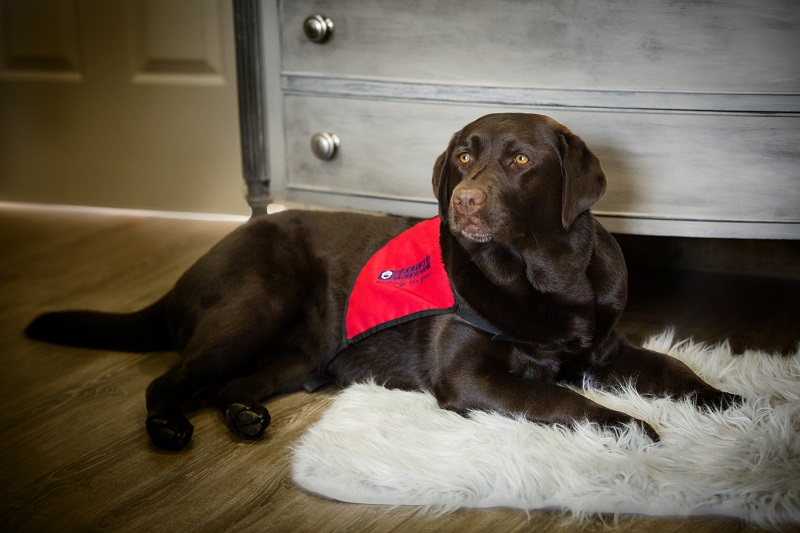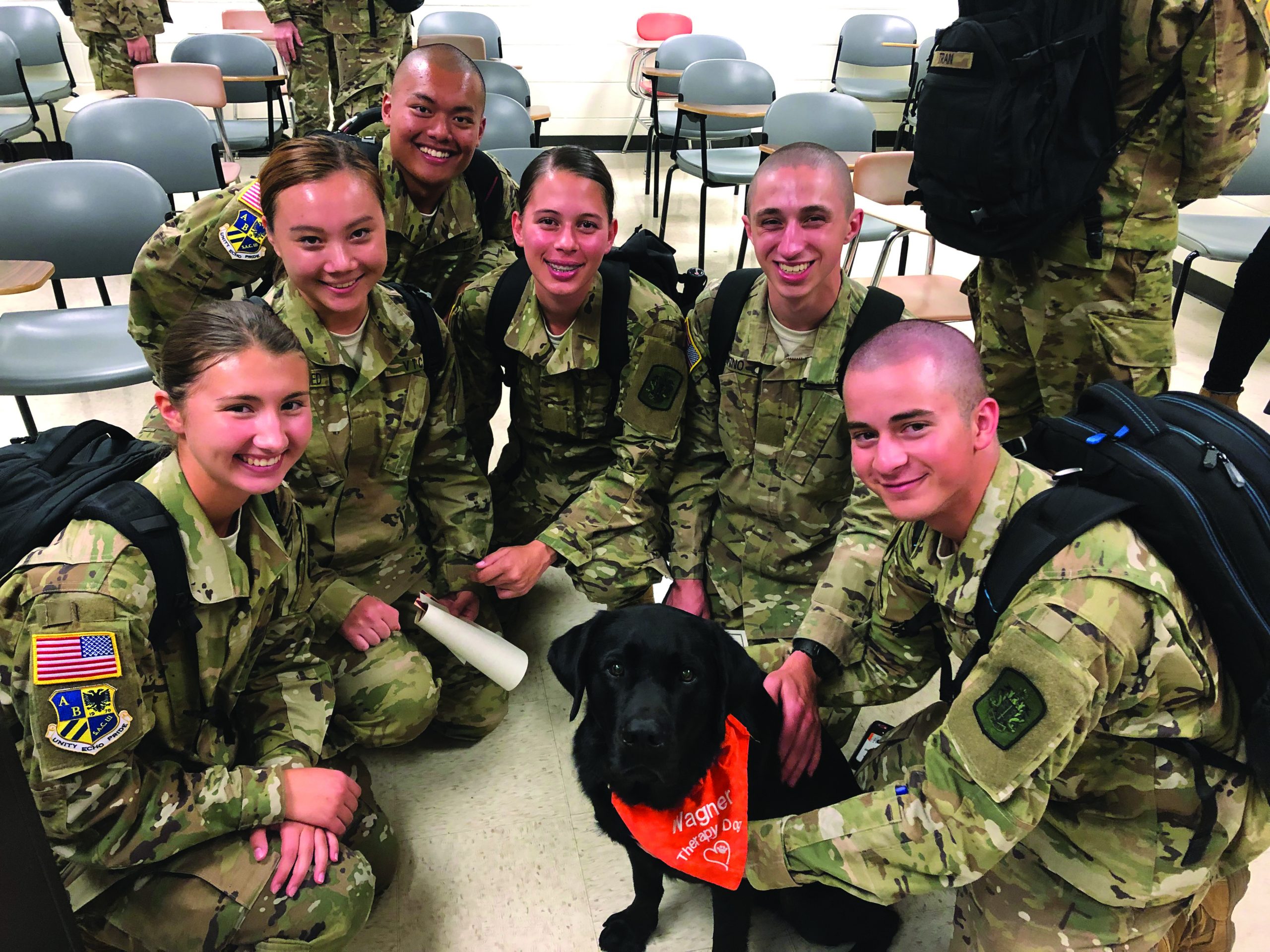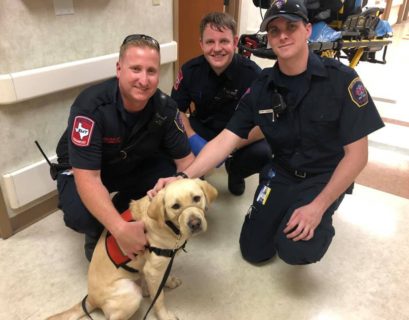In many ways, a dog named Molly Jo seems like a typical Lab. Not only is the chocolate Lab beautiful, but she’s smart, eager to please, and loves to give and receive affection.
But this Lab has one very unusual trait: She’s bilingual. Molly “speaks” English and Spanish – something that serves her well in her job as a therapy dog at nonprofit facilities in New York.
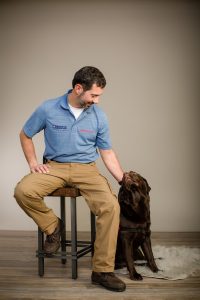
Molly and Memo (Photo courtesy of Michael Graziose)
“Everything about her excites me,” enthuses her owner, June Bleich of Long Island. “She’s sweeter than sugar.”
June and her husband Eric knew Molly was special from the get-go, so when she was three months old, they hired trainer Guillermo “Memo” Roa to work with her. Memo, who grew up in Bogota, Columbia, but immigrated to the United States over two decades ago, has trained dogs virtually all his life and is fluent in English and Spanish.
When working in training sessions with Molly and her humans, they’d practice commands like sit, stay, and come. But when Memo was training Molly by himself, he’d speak to her in his first language, Spanish – sit became sientate, for instance – and she started responding to both languages. She was easy to train since she craves affection even more than food.
“Her motivator is love,” he explains.
Delighted, June asked Memo if he thought Molly could become a therapy dog for nonprofit organizations that serve both English and Spanish speakers – and if he’d become her handler. Soon Molly passed her therapy dog test and became certified by the nonprofit Alliance of Therapy Dogs. Molly and Memo were officially a therapy dog team.
Last summer, they visited immigrant children who had been separated from their families and were receiving legal services from the nonprofit Kids in Need of Defense (KIND).
“When Memo was with these children it was unbelievable, because they could only speak Spanish,” June recalls. “They loved being with him and with Molly.”
During the visit, Memo would approach children sitting by themselves and introduce them to Molly, which would set them at ease when the dog would understand them. Eventually they’d start talking to Memo about things in their lives that were scary or upsetting.
“I love dogs because they open hearts, you know? The smiles – you can see the dog is bringing these people happiness,” Memo says.
Twice a month, Molly, Memo, and June visit Covenant House, a nonprofit that provides housing to vulnerable homeless, runaway, and exploited young people ages 16-24. Molly starts jumping when they get close because she’s so excited to spend time there. Once inside, they head to the gym to play basketball or soccer with young people before settling into a group circle. Molly greets every person in the circle, which helps break the ice.
Molly has helped draw reserved people out of their shells. In one meaningful encounter, a young man was so excited to see Molly again that he met the team at the door and escorted them to the gym. At the end of the session, as Molly was lounging at his feet, he told June he’d dropped out of high school in 10th grade. She encouraged him to take advantage of the resources offered by Covenant House and finish high school. A few days later, she learned the young man had enrolled in a high school equivalency program and was “psyched” to get started.
“My day was made,” she says. “The magic that can be tapped from our canine companions has no limits.”
Tom Manning, vice president of public relations and marketing for Covenant House New York, said some young people haven’t had a pet and are initially wary of Molly – but she wins everybody over by the time she leaves.
“The young people who come to us have been robbed of the precious gifts of home and family and things that a lot of us take for granted,” he shares. “When they come to us, obviously we meet their immediate needs first: food, clothing, shelter, medical attention. Once they’re safe with us, we work on job training or getting back to school. But another big piece of what we try to do is make it feel like home. Molly brings a sense of joy. She really does make a difference, and we see it every time they come.”
He said whenever Memo introduces Molly to a group and announces, “She can speak two languages!” the kids can’t believe it and say things like, “What do you mean this dog speaks two languages?” It gets many of them engaged and talking right off the bat. Then they spend time playing with Molly or working with her in English and Spanish – and rewarding her good behavior with cuddles and treats. (No wonder she loves her work so much!)
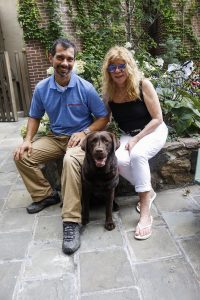
Molly with Memo and June Bleich at Covenent House. (Photo courtesy of Marissa Yates)
At least once a month, Molly, Memo, and June visit the Farmingdale Day Habilitation Center of YAI, a nonprofit that supports more than 20,000 people with intellectual and developmental disabilities each year by “promoting opportunities for living, loving, working, and learning,” including residential services.
Stephanie Lupo Johrden, volunteer and employment specialist at YAI, says Molly helps clients in a variety of ways. She’s helped people learn how to tell if a dog is friendly, how to groom a dog, or how to walk one on a leash. And, of course, the Lab generates lots of smiles.
“The best thing about Molly is how she sees everyone; it’s consistent with our message: seeing beyond disability,” she says. “People who may not be around adults with intellectual and developmental disabilities might be afraid of saying the wrong thing, so they’re hesitant to say hello or to wave. But Molly just sees somebody who’s enthusiastic about meeting her and wants to get to know them.”
One man with a limited vocabulary who utilizes a wheelchair particularly loves spending time with Molly. He practices saying commands, even though spoken language can be challenging for him, and now tries to communicate more readily. He’s also practiced gripping Molly’s leash to build dexterity in his hands, and holding treats to offer her. So while he’s having fun with Molly, he also gets a bit of speech and occupational therapy.
“It’s something that really encourages him to be much more active and involved in a group session,” Stephanie says. “He doesn’t want to leave the room when she’s there.”
Because Molly is so calm and gentle – even at just three years old – the team at YAI has never worried that she’ll accidentally nip someone or pull too hard on her leash. Instead, she gives kisses or rolls onto her back for belly rubs. Her visits help re-energize the staff as well.
“Molly is a very special dog,” she says. “We’ve very lucky to have her.”
For more information about Molly and Memo, visit: www.mollyandmemo.com. For more information about Alliance of Therapy Dogs, visit: www.therapydogs.com. For more information about KIND, visit: supportkind.org. For more information about Covenant House New York, visit: ny.covenanthouse.org. For more information about YAI, visit: www.yai.org.

